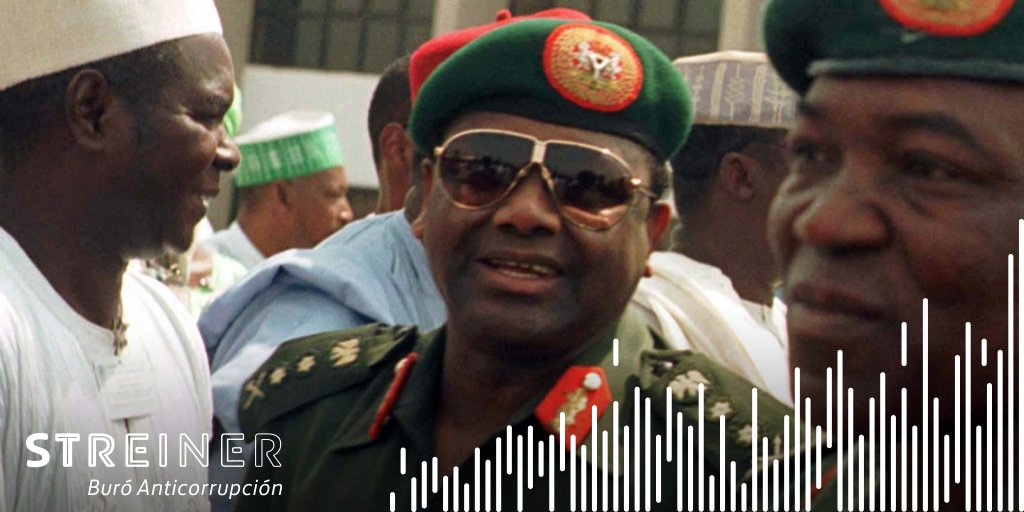Political Corruption in Nigeria: Sani Abacha
Por: Laura Paola Villa García | Posted on August 30, 2019

Context
During the mid-twentieth century, Nigeria was in constant political instability due to an important amount of coup d’etats.
In November of 1993, Sani Abacha seized power and became the president and subsequent dictator of Nigeria until 1998 (Timeline, 2019).
Facts: Who gave what to whom and why?
Throughout his five years of rule, Abacha was involved in a series of corruption scandals, however, it was not until he died when it was discovered that he had taken around USD $3,000 y USD $5,000 millions from Nigeria’s public resources. According to Nigeria’s authorities, Abacha’s family, associates and he himself had deposited the money in some of the most important banks in London (Pallister & Capella, 2000).
Nigeria’s government managed to recover recuperar USD $1,000 millions thanks to the Abacha’s son, Muhammad, who confessed his father gave him USD $700 millions in cash for a two-year period (Pallister & Capella, 2000).
According to UD Department of Justice, the money stolen by Abacha was laundered through purchase of government bonds which were backed by US financial institutions (Transparency, 2014).
Moreover, Nigeria’s government estimates that USD$2,300 million were taken by the Central Bank, USD $1,000 million are related to public procurement and USD $1,000 million were taken through foreign company extorsions.
Abacha’s associates cashed out the money and deposited into US financial institutions and late Abacha and his finance minister bought inflated government bonds through a company controlled by Abacha himself (Transparency, 2014).


Applicable Law
United Nations Convention Against Corruption
¿Why is this case relevant?
This case has huge relevance as it is considered the biggest case of corruption perpetrated by a government. Nigeria’s case has exposed the global financial system in relation to money laundering monitoring.
Furthermore, the present case is relevant because of the contribution of various government to Nigeria’s asset recovery. For example, last year Switzerland recovered USD $322 millions from Abacha’s bank accounts (Pallister & Capella, 2000).
Lessons learned
This case shows an unprecedented level of corruption perpetrated by a government that must serve as a lesson to implement more efficient measures against public officials that act in a corrupt manner.
Also, Nigeria’s case of an example of mutual legal assistance stolen asset recovery assistance and money laundering monitoring due to the fact that countries such as Switzerland, Luxembourg and Liechtenstein froze Abacha’s family accounts.
What type of corruption is it and what are the crimes involved?
First, this case involves embezzlement, which occurs when a person holding office in an institution dishonestly and illegally appropriates, uses or traffics the fund they have been entrusted with for a personal enrichment (Anticorruption, s.f.). Let’s not forget that Abacha and his family took USD$2,300 million from Nigeria’s Central Bank, USD $1,000 million in public procurement and USD$1,000 million for extortions, all for personal enrichment.
Second, the case involved extortion, which is the act of utilizing, either directly or indirectly, one’s access to a position of power to demand unmerited compensation, usually as result of coercive threats (Anticorruption, s.f.). Abacha used USD$1,000 million in order to extort foreign companies.
Third, Abacha’s actions show that this is a case of grand and political corruption due to the fact that the size of the transactions involve more money than bureaucratic corruption (Anticorruption, s.f.).


References (Harvard – Anglia)
Pallister, D. &. C. P., 2000. The Guardian. [Online]
Available at: https://bit.ly/2lBIk20
International, T., 2019. Transparency International the global coalition against corruption. [Online]
BBC, 2019. BBC. [Online]
Available at: https://bbc.in/2Mqynfz
Justice, T. U. S. D. o., 2019. The United States Department of Justice. [Online]
Available at: https://bit.ly/2kh2D4T
International, T., 2019. Transparency International the global coalition against corruption. [Online]
Available at: https://www.transparency.org/en/news/25-corruption-scandals#Ben%20Ali
Abogados, D., s.f. Glosario de Derecho Anticorrupción. [Online]
Available at: Ebook